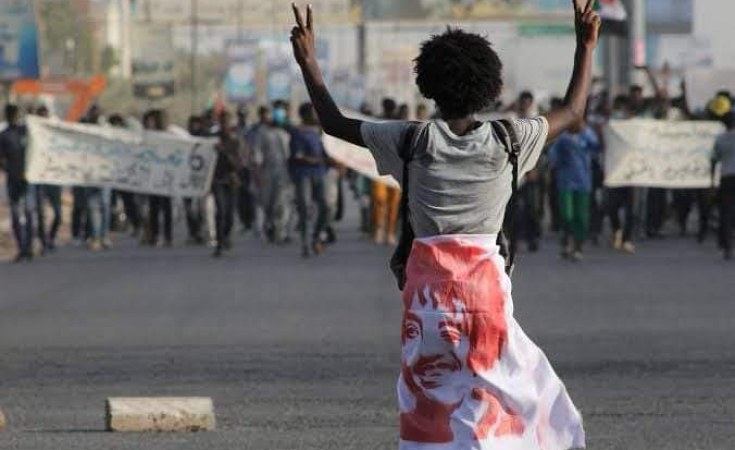East African bloc IGAD has been involved in efforts to mediate over the war in Sudan for months, and says it has secured a commitment from warring parties to implement a ceasefire and to hold a political dialogue aimed at resolving the conflict. On the ground the UN is now lacking fund, and the victims of the war are on the verge of a catastrophe.
At talks on Saturday in Djibouti with the members of the Intergovernmental Authority on Development (IGAD), Sudan's army chief Abdel Fattah al-Burhan agreed to a one-on-one meeting with RSF commander Mohamed Hamdan Dagalo, an IGAD statement said.
In a phone call, Dagalo, widely known as Hemedti, also agreed to the ceasefire proposal and a meeting with Burhan, the statement added.
Both Hemedti and Burhan "accepted the principle of meeting within 15 days in order to pave the way for a series of confidence-building measures between the two parties that could lead to the launch of a political process," said Alexis Mohammed, adviser to Djibouti's president.
#IGAD secures commitment from #Sudanese belligerents to sign ceasefire agreementSudanese Sovereign Council Chairman Abdel Fattah al-Burhan and Rapid Support Forces (#RSF) leader Mohamed Hamdan Daglo have agreed to sign a cessation of hostilities agreement. This breakthrough was... pic.twitter.com/VmF5kFtvqN-- Addis Standard (@addisstandard) December 11, 2023
Sudan's army and the paramilitary Rapid Support Forces (RSF) have been locked since mid-April in a conflict that has devastated the capital Khartoum and triggered waves of ethnic killings in Darfur despite several diplomatic efforts to halt the fighting.
Their power struggle has killed more than 12,190 people, according to the Armed Conflict Location & Event Data Project (ACLED).
The United States said last week that Sudan's rival forces have both committed war crimes in their brutal conflict, accusing the paramilitary Rapid Support Forces of ethnic cleansing and crimes against humanity, following the European Union.
Meanwhile, on the ground, eyewitnesses reported blasts at the major Al-Jaili oil refinery on the outskirts of Khartoum on Sunday.
Both sides said there had been casualties when a Red Cross convoy came under fire in the capital.
The ICRC is shocked and appalled by a deliberate attack on its humanitarian convoy in Khartoum (Sudan) on Sunday. Read more: https://t.co/jVz9nMSBEW pic.twitter.com/utEO20zFgC-- ICRC (@ICRC) December 10, 2023
Humanitarian disaster in a "forgotten war"
At the same time, the United Nations said war-torn Sudan faces 'catastrophe' as their funds run short.
The UN has only been able to reach a fraction of the nearly 25 million people needing aid, the head of the UN's humanitarian response in the country says.
But assistance to even those four million could soon stop if the chronic lack of funding continues, Clementine Nkweta-Salami said on Sunday.
The UN's humanitarian coordinator for Sudan said the situation is "catastrophic" and aid workers have called it the "forgotten war".
There are also "seven million people displaced in Sudan, which is the highest displacement situation globally," said Nkweta-Salami.
Yet despite the scale of the crisis, the humanitarian response remains woefully underfunded.
"We've received only 38.6 percent" of the total $2.6 billion needed for 2023, Nkweta-Salami said.
"There will come a time when even if we have (physical) access, we will not have the resources to enable us to channel the relevant assistance that we need to do," she warned.
Call for peace
Sudan's tragedy has been overshadowed by the Israel-Hamas war in Gaza from October, and then saw nearly all aid groups disappear.
One of a handful of organisations still providing vital aid across Sudan is the Norwegian Refugee Council (NRC).
"I have never, in all my years, seen such a horrific mega-catastrophe with so little attention or resources to reach people in their hour of greatest need," said NRC's secretary general, Jan Egeland.
"Millions are trapped in the crossfire, in ethnic violence, in bombardments, and we are simply not there."
The gaps, Egeland and Nkweta-Salami agree, are huge.
According to the UN representative, "we are facing a population that is about 24.7 million people in need of humanitarian assistance," or more than one in two Sudanese.
Only recently was the UN able to regain limited access through Chad into areas of Darfur, Sudan's vast western region where the UN has warned of a repeat of violence that occurred there in the early 2000s.
In recent weeks, pro-army demonstrators and high-ranking officials loyal to Burhan have accused the United Arab Emirates of supporting the RSF, which controls much of the country's lucrative gold mines.
On Sunday the official news agency SUNA reported that Sudan's foreign ministry declared 15 UAE diplomats persona non grata, demanding they leave Sudan "within 48 hours."
"We need the two parties to arrive at a ceasefire," Nkweta-Salami said. "We need eventually a cessation of hostilities. The people of Sudan need peace."
(with newswires and RFI)


